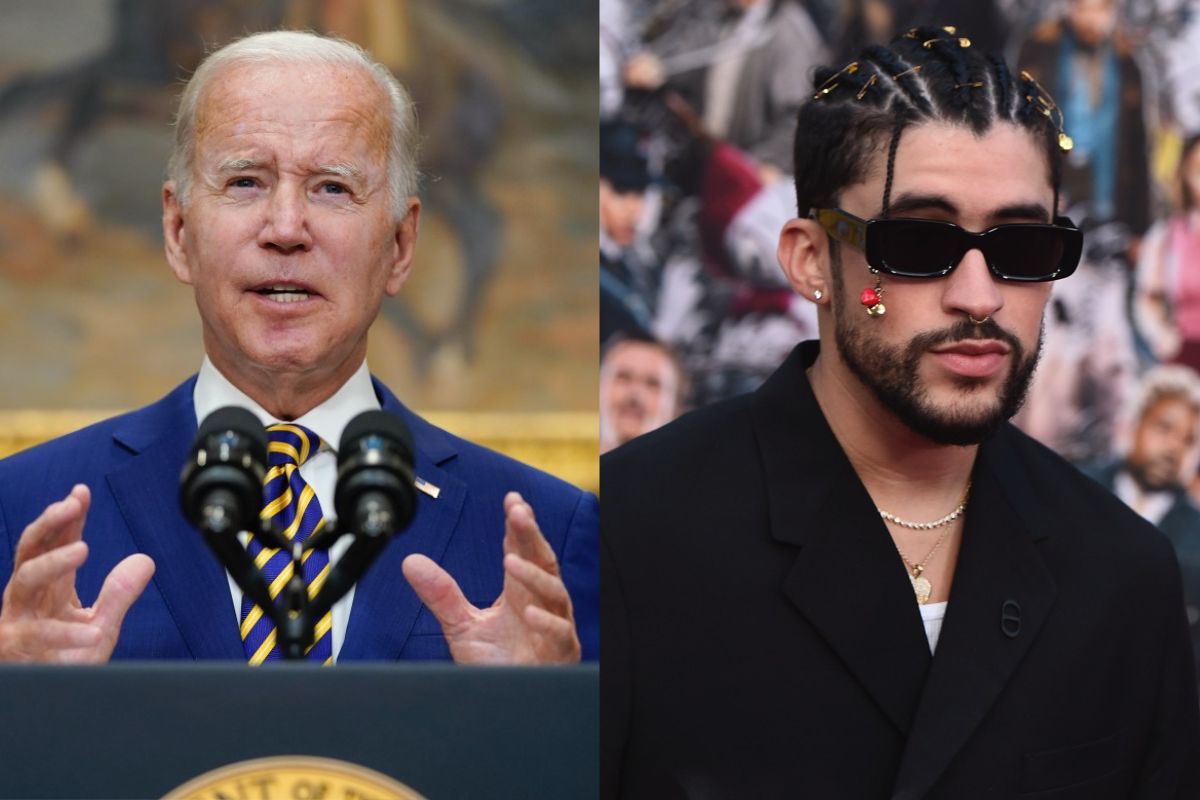

From left: President Joe Biden and Puerto Rican artist Bad Bunny (Evan Vucci/Jordan Strauss/AP)
UPDATE, February 8: During Tuesday night’s State of the Union, President Biden did mention Puerto Rico in his speech, when he said the following: “In addition to emergency recovery from Puerto Rico to Florida to Idaho, we’re rebuilding for the long term.”
On Sunday night, Bad Bunny opened the 2023 Grammys with an all-Spanish performance that was unabashedly Puerto Rican. Already credited for being the first artist to earn an Album of the Year nomination for a Spanish-language album (Un Verano Sin Ti), the global superstar once again the pride of Puerto Rico, even though he didn’t win in the coveted category that an entire island and its diaspora had hoped he would.
Such a night will go down as the latest example of how Bad Bunny will always put Puerto Rico first and use his platform to boost its visibility and make sure it doesn’t go ignored.
But even in that moment, disrespect towards Puerto Rico and its people seeped into the celebration when many of his fans thought that the captions “singing in Non-English“ during his performance and “speaking non-English” during his acceptance speech for Best Música Urbana Album were insulting. Even though the later West Coast broadcast included Spanish-language captions, Puerto Ricans made sure the screen grabs of the original “non-English” captions didn’t suddenly disappear without comment.
Given that Puerto Ricans live in a condition of perpetual second-class citizenship —thanks to decades of U.S. colonial rule that have led to no actual resolution to their political future— what happened Sunday night was not just about reacting negatively to captions at an awards show. The issue goes way deeper than that.
Puerto Rico continues to be forgotten and disrespected. The island that the United States invaded 125 years ago could now be slowly slipping away again from U.S. consciousness. The destruction from Hurricane María in 2017 and the political disdain of President Trump raised interest and awareness, but recently it seems as if the only one who keeps Puerto Rico in the news —outside of a natural disaster— is Bad Bunny himself.
It doesn’t have to be this way. Puerto Rico cannot be ignored, now more than ever, with issues like climate change and tax havens that have Puerto Ricans asking what kind of Puerto Rico they want to be: one for just a wealthy few, or one for all Puerto Ricans?
Just recently, the fight against the privatization of public beaches in Puerto Rico resulted in violence, when a private security guard shot a protester in the leg. Groups including representatives from the ACLU and Amnesty International have already called for both local and federal investigations.
Puerto Ricans on the island colony and in the diaspora have been following such stories closely, and, at some point, it can’t just be Bad Bunny performances calling attention to them.
Enter Jill Biden.
The First Lady appeared as a presenter at the Grammys Sunday night, only minutes after Bad Bunny had given his unapologetically Boricua performance. If during Tuesday night’s State of the Union, President Biden were to mention a single thing about Puerto Rico, it could be that perhaps the most authentically Puerto Rican performance U.S. television history played a role.
That connection is a stretch for sure, but with Puerto Ricans feeling ignored, why can’t one be hopeful that President Biden might address at least one issue directly connected to Puerto Rico? Bad Bunny just sang and spoke in Spanish at the highest-viewed Grammys in three years. Puerto Rico has some momentum again, and Biden could help keep it going.
The issue of Puerto Rico’s political status had some political legs back in December, when the then-Democratic-controlled House passed the Puerto Rico Status Act with bipartisan by a 232-191 margin, although it never made it to the Senate floor.
Inspired by Bad Bunny, Biden could acknowledge that Puerto Rico has been a U.S. colonial possession for over a century, and what better way to end colonialism in Puerto Rico than by signing a bill to allow for a binding plebiscite that would give Puerto Ricans the option to decide whether they want to be a new state of the Union, become independent, or form a free-association relationship with their former colonial masters?
Just one or two sentences in his yearly address to Congress could radically alter the political course of Puerto Rico. According to Biden, Puerto Ricans sort of raised him politically in Delaware, so his mentioning them in the State of the Union address isn’t too far-fetched.
It would also force Congress to realize that around six million people are U.S. citizens of Puerto Rican descent. In states like Florida, where Puerto Ricans continue to gain political power, Republican Sens. Marco Rubio and Rick Scott have both addressed the status issue in the past. Getting them to move on it would directly challenge someone like Sen. Mitch McConnell (R-KY) and his fear of “full-bore socialism” whenever Puerto Rico is mentioned.
The prospects of all these scenarios are extremely low. Most likely, the colonial status quo will remain, and Puerto Rico will still face critical moments that could see it transformed into a completely different island. Puerto Ricans will still be reminded that they are “Americans” like others and never really feel a part of the United States.
Meanwhile, Bad Bunny will remain as defiant and joyful as ever, singing in Spanish with “non-English” captions that, while Puerto Rico may be ignored by the rest of the United States and the rest of the world, it will never be forgotten by its people.
***
Julio Ricardo Varela is the president of Futuro Media and founder of Latino Rebels. He also co-hosts the In The Thick political podcast and is an MSNBC Opinion Columnist. Twitter: @julito77


